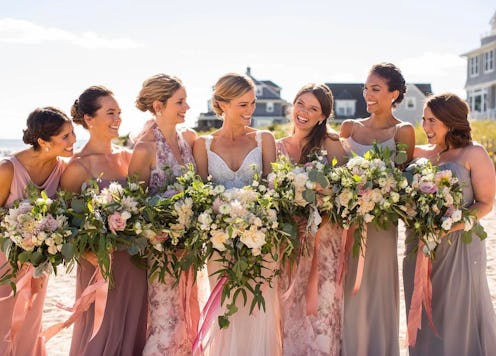Though it’s 2016, it would be difficult to argue against the fact that we continue to live in a culture of fear when it comes to being an unmarried woman past the age of 29. As that magic number came and went for this author, sans the coveted diamond ring and all its trappings, she heard things (usually from men) like, “Do you just want to end up like one of those sad ladies in Sex and the City?” Times are changing, however, albeit slowly, as the average age of marriage slowly creeps upward year after year. If you’re among those who are waiting to get hitched until after the expiration date so generously bestowed on you by society for doing so respectfully, here are more than a few reasons you should be glad you’re taking your time to settle down.
Why Getting Married In Your 30s Is The Best
Remember the episode of Sex and the City in which Carrie wanted to go to Bungalow but Aiden wanted to stay at home with a bucket of chicken? Carrie went anyway, but as soon as she got there she realized she was over places like Bungalow, and that she just wanted to go home and eat chicken in bed with her boyfriend. In your twenties, you want to be up in the club. In your thirties, you want KFC. Getting married a bit later in life means you appreciate all of those nights at home with your spouse, because you already did all of the more exciting stuff in your twenties and now you're exhausted.
Many couples get married young and grow together, and there is absolutely nothing wrong with this approach. In fact, it makes for some of the sweetest and most romantic marriage success stories out there. That said, there are definite advantages to getting married in your thirties. For one, your career and social circle are more established, which means you're not as reliant on your partner for your identity, which just diminishes pressure within the relationship. You also have a much better understanding of what you want out of life, how you feel about major life decisions like having kids, and what type of partner would best fit this more fully-formed vision for your life.
Having been a bridesmaid a few times, attended more weddings than you care to remember, and spent half of your life savings on the happiness of others, you know by your thirties what not to do when it comes to your own wedding. When you get married in your twenties, for example, chances are you're going to invite a few people—including bridesmaids—who are not going to make it with you into your thirties. This doesn't necessarily mean you've fallen out with them, it just means that as you grow older, your capacity for maintaining a multitude of relationships diminishes, and some are lost as a result. If you get married in your thirties, there's less of a chance your wedding photos will include people whose names you won't remember twenty years from now.
This goes for the actual marriage, too—by the time you're in your thirties, you've probably already seen a few of those early marriages fall apart. Bearing witness to these missteps will help ensure you make a well-informed—and perhaps slightly less naive—decision when it's your turn to settle down.
This one definitely isn't a given, but even the most financially disastrous thirty-something likely knows more about managing their finances than most twenty-somethings and (again, not a given) chances are you've both exited the starving student phase of life and can better manage adulting together. Combining assets might be trickier since you're both more likely to have them than you would have been in your twenties, but you should be fine as long as there's open communication in advance of the event. Another financial benefit to marrying later? You might actually (and the key word here is "might") be able to afford to have children.
As an added bonus—and this is a biggie—women who tie the knot after the age of 30 add an average of $18,000 to their annual earning power, according to this study.
We all know first loves are amazing, and nothing ever compares to the feeling you have inside of that relationship; however, first loves tend to be 99.9% emotional and 0.01% rational. This author's first love—who she once thought she would die without—recently propositioned her while in town on business, having left his pregnant wife behind. In hindsight, this is always who he was, but at the time, rose-colored, first-love glasses transformed him into something magical. Later in life relationships tend to strike a better balance between rational and emotional considerations.
We're kidding, but only a little. At a certain age, it can feel a bit silly to ask your friends for household appliances when you've clearly done just fine without their contributions to your kitchen for the last decade. Having already established many of the trappings of a home by the time you get married means you can register instead for more fun gifts, like vacation donations. We love the idea of registering for a home downpayment contribution as well—what would be more meaningful for you life than a home built by the love of your friends and family? Certainly not a juicer.
